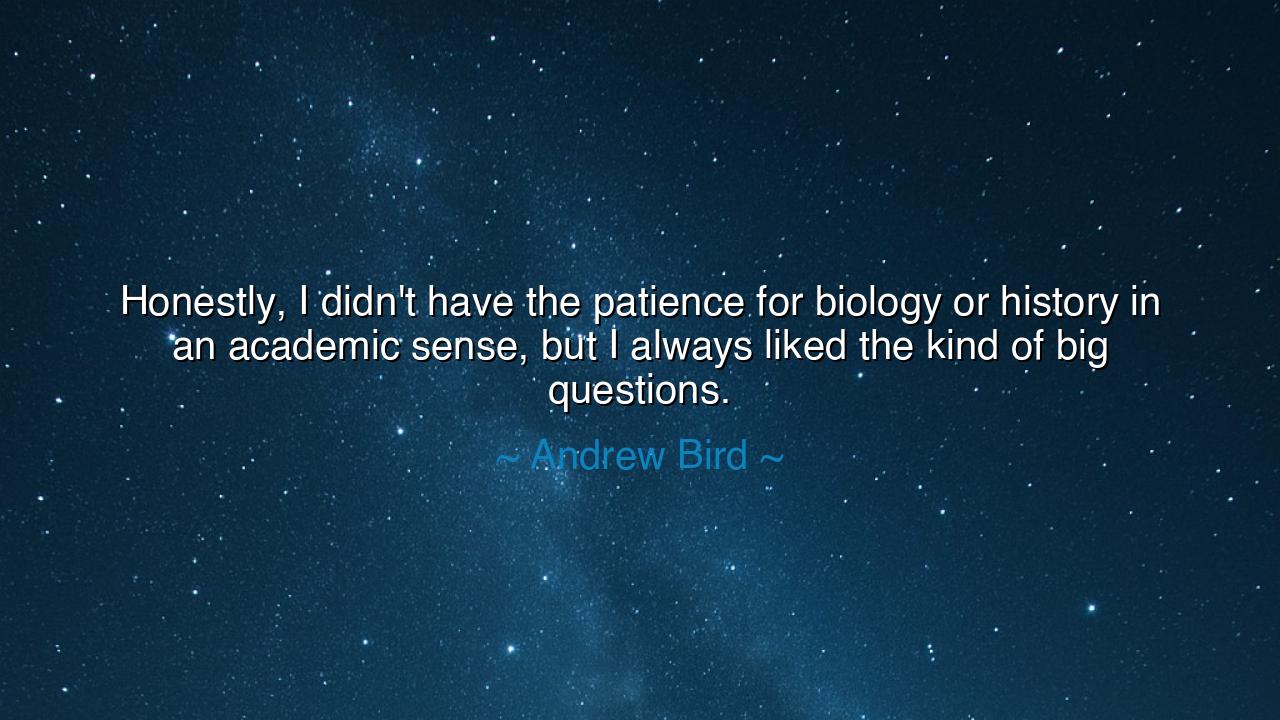
Honestly, I didn't have the patience for biology or history in
Honestly, I didn't have the patience for biology or history in an academic sense, but I always liked the kind of big questions.






Hear, O seekers of wisdom, the words of Andrew Bird, musician and poet, who confessed with humility: “Honestly, I didn't have the patience for biology or history in an academic sense, but I always liked the kind of big questions.” In this utterance, we hear the voice of one who did not walk the narrow road of formal learning, yet who longed to touch the infinite with his mind. For he reminds us that wisdom wears many garments: some find it in textbooks and laboratories, others in the melodies of thought, the rhythm of wonder, and the pursuit of truth beyond mere detail.
For biology and history, in their academic sense, demand great patience: hours bent over microscopes, days buried in archives, the slow gathering of fact upon fact. Many are called to this path, and their diligence builds the foundation of knowledge. But Bird, restless in spirit, turned not to the small pieces but to the big questions—those that stretch beyond the page, questions of meaning, of purpose, of why we are here at all. He reminds us that the love of wisdom is not always in the minutiae, but in the horizon toward which the minutiae point.
Consider, O listener, the philosopher Socrates, who disdained writing and declared that he knew nothing. He had little patience for catalogues of data, yet his ceaseless hunger for the big questions—What is justice? What is the good life?—shaped all of Western thought. His students, Plato and Aristotle, gave form to his restless inquiries, yet it was the spirit of questioning, not the patient gathering of detail, that made Socrates immortal. Bird’s words echo this spirit: that one may lack patience for detail, yet burn with passion for the vastness of truth.
So too can we recall Albert Einstein, who as a child was slow to speak and unremarkable in school. He found little joy in memorizing facts, yet he stared into the heavens with wonder, asking the greatest of questions: What is time? What is space? What is light? From this restless vision was born the theory of relativity, which reshaped science itself. Thus, the big questions have always been the compass of genius, guiding those who do not fit neatly into the structures of academic patience.
Yet let us not despise patience, for even the restless dreamer must honor it in some measure. The pursuit of big questions without grounding can become folly, chasing illusions without anchor. But the lesson of Bird’s words is balance: that some are called not to master details, but to inspire with vision, to remind us that beneath every fact lies a question of meaning. The patient scholar and the restless seeker are both needed, for together they weave the fabric of human understanding.
What lesson, then, must we draw from this? That each soul must know its own calling. If you are drawn to detail, embrace the patience of the historian and the biologist. If you are stirred by the big questions, pursue them with courage, even if the classrooms of the world cannot contain your wonder. For both paths, though different, lead toward the same truth: the discovery of who we are, where we came from, and where we are going.
Therefore, O child of tomorrow, heed Bird’s confession not as failure but as freedom. Do not despise yourself if you lack patience for one kind of knowledge; instead, follow the fire that burns within you. Ask the big questions, seek the infinite, and let your heart guide you where your hands cannot. For wisdom is vast, and there are many ways to approach it. Some kneel before the microscope; others lift their gaze to the stars. Both are servants of truth, and both are needed to keep alive the great human story.






AAdministratorAdministrator
Welcome, honored guests. Please leave a comment, we will respond soon